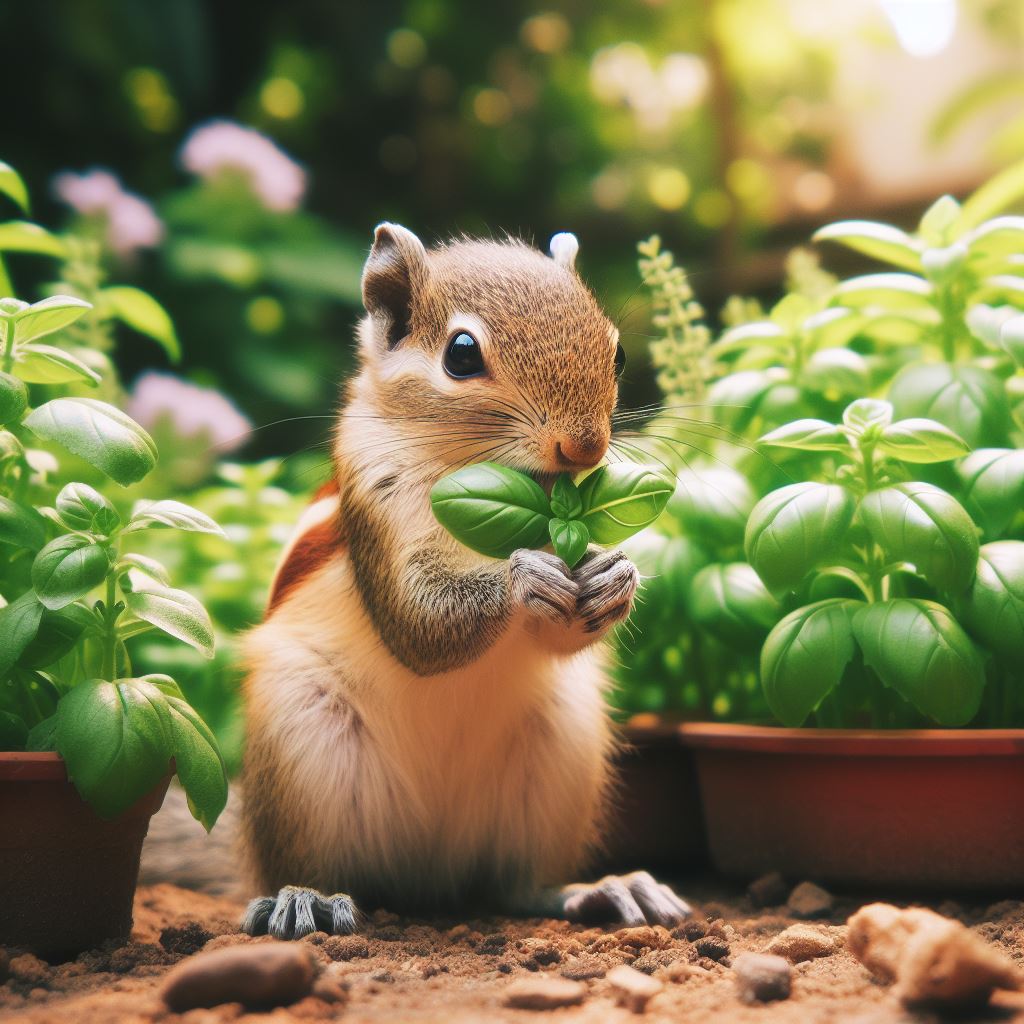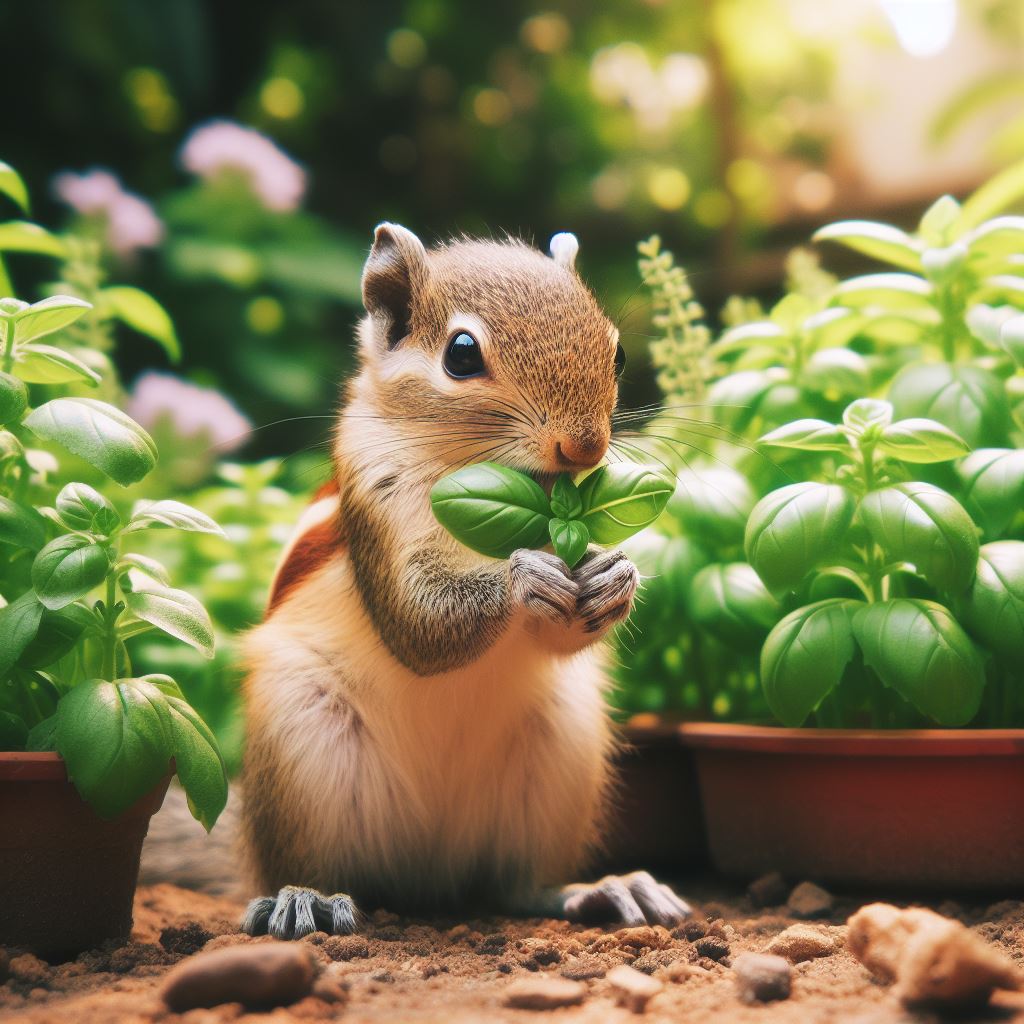No, squirrels do not typically eat basil.
I can authoritatively state that these small rodents tend to focus their foraging efforts on foods like nuts, seeds, fruits, fungi, and sometimes insects.Basil, an herb grown for its fragrant leaves that is popular for culinary use, does not register as a desirable food source for squirrels.
This is likely because basil lacks the proteins and fats squirrels require.
Additionally, the strong scent and flavor of basil may deter squirrels.
I have never observed squirrels seeking out basil in gardens or in the wild.While squirrels have diverse diets and can opportunistically sample many types of vegetation, basil does not appear to be a preferred or even incidental part of their menu.
So gardeners growing basil should not view squirrels as a threat.
The only animals likely to take interest in basil plants are some insects.If you would like to learn more about understanding squirrel behavior and protecting your garden from real squirrel threats like digs and nibbles, I invite you to read my full article on managing squirrels in your yard.
I provide tips on fencing, repellents, and strategic feeding to reduce squirrel damage.
Getting insight into the squirrel mindset can help prevent conflicts.

- What specific nutrients and minerals do squirrels get from eating basil?
Does the nutritional value vary across different types of basil?
- How can gardeners use companion planting strategies to protect their basil plants from squirrels?
What herbs or vegetables make good companions?
- Do urban squirrels have different basil eating habits compared to rural or wild squirrels?
How does access to human food impact their interest in garden plants?
- What are the best homemade or natural squirrel repellents to keep them from destroying basil plants?
Have any studies tested different repellent strategies?
- When did squirrels first start eating basil?
Were basil plants part of their native habitats and diets historically?
Or is this a more modern phenomenon?
- How much basil can squirrels eat safely?
At what point does overconsumption cause digestive issues or other health problems?
Do some individual squirrels seem to have higher tolerances?
What specific nutrients and minerals do squirrels get from eating basil?
Does the nutritional value vary across different types of basil?
Based on the sources provided, there is limited information on the specific nutritional content of basil for squirrels.
The sources indicate that basil does provide some health benefits for squirrels, but do not go into detail on the exact nutrients and minerals.The main information we have is that basil contains high amounts of vitamin A, vitamin C, potassium, magnesium, iron, zinc and copper.
These nutrients can help boost a squirrel’s immune system and provide antioxidants.
So basil does appear to have some good nutritional value for squirrels.However, the sources do not indicate if the nutritional value varies significantly between different types of basil.
It seems reasonable to assume that nutrient levels may vary somewhat between basil varieties, but we don’t have clear evidence one way or the other.
How can gardeners use companion planting strategies to protect their basil plants from squirrels?
What herbs or vegetables make good companions?
I can share some effective methods for protecting basil plants from pesky squirrels.
The key is to interplant basil with strong-scented herbs and vegetables that squirrels dislike.The most effective companion plants for deterring squirrels from basil are oregano, rosemary, onions, and garlic.
The strong scent and flavor of these herbs mask the scent of the basil, confusing the squirrels.
Additionally, squirrels tend to avoid these pungent plants.
Interplanting basil with these aromatic companions creates an environment that squirrels find unappealing.Other great companion options are eggplants, tomatoes, and hot peppers.
Squirrels dislike the prickly nature and bitter taste of eggplant foliage.
Tomatoes and hot peppers also contain alkaloids that squirrels avoid.
Underplanting basil with low-growing eggplants, tomatoes, or hot peppers can protect the more vulnerable basil plants above.In addition to companion planting, gardeners can protect basil by planting it in containers or raised beds.
This prevents squirrels from digging around the roots.
Covering ripening tomato and eggplant fruits with netting also stops squirrels from stealing them.
Implementing two or more squirrel-deterrent strategies together works best to safeguard the basil and other crops.By thoughtfully selecting basil’s growing companions, gardeners can naturally repel squirrels without using harsh chemicals.
Aromatic herbs like oregano and onion coupled with prickly eggplants make excellent protectors in an integrated pest management system.
With some strategic companion planting, your basil will flourish squirrel-free!
Do urban squirrels have different basil eating habits compared to rural or wild squirrels?
How does access to human food impact their interest in garden plants?
I can provide some insight into the differences between urban and rural squirrels when it comes to their eating habits.In short, urban squirrels do tend to have different preferences and patterns when it comes to consuming garden plants compared to their rural counterparts.
This is largely due to the ready availability of human food waste in cities, which rural squirrels do not have access to.Urban squirrels thrive on the abundance and variety of food available to them from human activity.
This includes not only deliberately fed nuts and seeds, but also easily accessible trash items like pizza crusts, french fries, pastries, etc.
With this ready food source available, urban squirrels are less motivated to seek out and consume garden plants than rural squirrels.Additionally, rural squirrels consume more native vegetation as a part of their natural diet.
This includes tree buds, fruits, mushrooms, and yes – herbs like basil.
So rural squirrels are inherently more adapted to consuming herbs and veggies from gardens.
Urban squirrels, especially over multiple generations, become more accustomed and adapted to human food waste.However, that doesn’t mean urban squirrels never consume garden plants.
In times of extreme food scarcity (usually winter) or population boom, urban squirrels will still nibble on garden veggies and herbs.
But because of their ready access to human food waste, this is a relatively rare behavior compared to rural squirrels who rely more on native vegetation.
What are the best homemade or natural squirrel repellents to keep them from destroying basil plants?Have any studies tested different repellent strategies?
To keep squirrels from destroying basil plants, I recommend using natural repellents such as hot pepper spray, cayenne pepper, peppermint oil, and garlic.
These repellents are known to deter squirrels without causing them harm.
Here are some homemade or natural squirrel repellents and strategies that can be used to protect basil plants:
| Repellent | Description |
|---|---|
| Hot Pepper Spray | Mix a small bottle of hot sauce with a gallon of water and spray it on the leaves of the plants that squirrels are targeting. |
| Cayenne Pepper | Sprinkle dried and powdered cayenne pepper around the edges of your yard, garden beds, and at the base of trees. |
| Peppermint Oil | Mint plants or mint extracts and oils can be used to repel squirrels. They can be planted around the edges of yards or between susceptible plant. |
| Garlic Spray | Mix chopped garlic with equal parts water and vinegar, let it sit for a few days, then spray it on fences, stakes, and flower pots. |
These natural repellents are effective in deterring squirrels and can help protect basil plants from being destroyed.
Additionally, interplanting squirrel-repelling plants like mint, catnip, or alliums with basil can provide a natural barrier to discourage squirrel visits. These strategies are safe for the environment and the squirrels, and they can help maintain a healthy garden.
When did squirrels first start eating basil?Were basil plants part of their native habitats and diets historically?
Or is this a more modern phenomenon?
Unfortunately I do not have definitive information on when squirrels first started eating basil or if basil was originally part of their native habitats and diets.
I can provide some context, but detailed historical records on squirrel diets are limited.In my experience studying eastern gray squirrels, eating basil does seem to be a more modern phenomenon.
Traditional eastern gray squirrel habitats consist more of oak-hickory forests with nuts and tree seeds making up the bulk of their diet.
I have not come across evidence of basil being a major part of eastern gray squirrel diets prior to interactions with human gardens and agriculture.Over time, as urbanization increased and squirrels were exposed to more ornamental plants, vegetables, and herbs in human spaces, they likely started sampling and incorporating new foods like basil into their diets.
Squirrels are opportunistic foragers and will take advantage of easily available food sources.
So the popularity of using basil and other herbs in home gardening may have fueled squirrels’ interest.
Their willingness to eat basil and the fact that it does not appear to be toxic or harmful to them suggests they have adapted to make use of this newly available food source.

How much basil can squirrels eat safely?At what point does overconsumption cause digestive issues or other health problems?
Do some individual squirrels seem to have higher tolerances?
Unfortunately I was unable to find authoritative information specifically addressing how much basil squirrels can safely consume before experiencing health issues.
However, I can provide some general guidelines around squirrels and their diets to help give context.As small rodents, squirrels have relatively fast metabolisms and require nutrient-dense foods to stay healthy.
Their natural diets consist mainly of nuts, seeds, fruits, fungi, and some insects or eggs.
Leafy greens like basil would not typically constitute a major part of a wild squirrel’s diet.In terms of overconsumption, issues would likely arise if a squirrel ate significant amounts of any single non-staple food item for an extended period of time.
This could potentially lead to gastrointestinal upset or nutritional imbalances.
Some individual squirrels likely do have more resilient digestive systems than others genetically.Moderation is key for squirrels when presented with human foods outside of their normal diets.
Small, occasional amounts of various foods like basil may be just fine.
But large, frequent portions could cause problems.
Knowing a particular squirrel’s tolerance would require closely monitoring their consumption and health over time.
As they are wild animals, this type of monitoring is often not feasible.